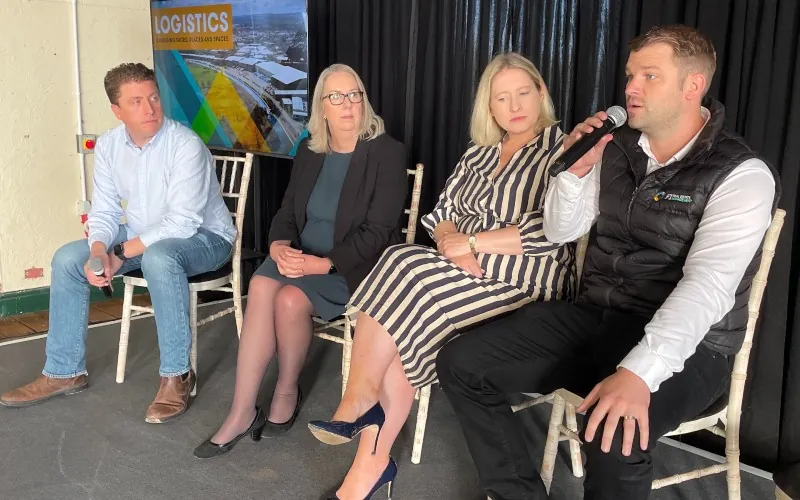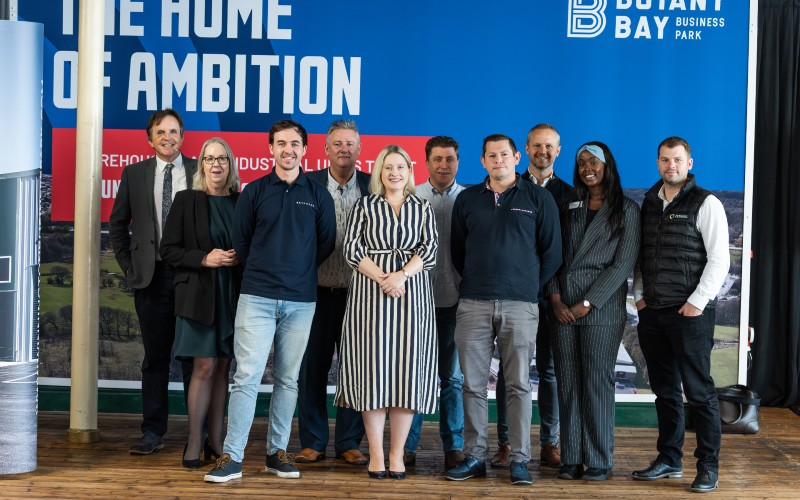The impact of Amazon has forced the logistics sector to ‘raise the bar’ when it comes to meeting rising customer expectations.
That was one of the conclusions of a logistics event – entitled ‘Changing faces, places and spaces’ – at the iconic Botany Bay in Chorley.
Nine expert speakers discussed a range of issues, including the future of logistics; automation; influence of technology; and the move towards net zero.
The business breakfast was hosted by FI Real Estate Management (FIREM) and saw FIREM open the doors of its home at Botany Bay, where construction is underway on 33 industrial units.
Damian McCluskey is a director of Cargo Overseas, which employs 90 people and has a turnover of £90m. He said the influence of Amazon had ‘raised the bar’ for everyone working in the logistics sector.
“It has raised our customers’ expectations,” he said. “They want to be able to log on and see where their shipments are without having to pick up the phone.
“Technology is impacting everything we do, from the way we interact with our customers, the way we plan what we do, to the way our staff work. It’s all about empowering our staff, giving them better visibility to do a better job for our customers.”
Hannah Barlow is the managing director at Dunsters Farm, a third generation food wholesaler headquartered in Rochdale. The company has a turnover of £25m and employs 126 people.
Barlow said: “We’re a logistics and a warehouse business. We use tracking. We use a lot of software in our business to make sure we are as efficient as we can be.
“We are using food management systems and we are bringing in a transport management system and a warehouse management system. They all link in with our existing ERP.
“Technology is crucial for the future of the business. The technology makes us more efficient and can bring down some of the human costs of the business.”
Anita Donohoe, group MD Logistics at Kinaxia Logistics, said automation allows you to remove some repetitive tasks from the process.
“For companies of our size what we’ve got to provide is agility,” she said. “The solutions could change. What you do through one warehouse today may be very different 12 months down the line when a new system comes in.”
Elliot Parnham is the founder of Skyfarer, which is pioneering the use of drone technology.

(L-R) Damian McCluskey, director of Cargo Overseas; Anita Donohoe, group MD Logistics at Kinaxia Logistics; Hannah Barlow, managing director at Dunsters Farm; Matthew Pickles, head of business development at FI Real Estate Management
He said: “We use drones for logistics and emergency services support. I think drones are going to be a daily occurrence in certain supply chains.
“I think drones will be used in the middle mile. I think that’s because the benefits of time, cost and CO2 savings are much larger than they are in the last mile.”
Jonathan Eeley is the chief commercial officer of Acuma Solutions, which delivers digital transformation.
He said: “The logistics sector has definitely moved towards a more serverless architecture. A cloud-based API technology rather than physical hardware with traditional data centres.”
Alex Grant is the managing director at Ceedbox, which simplifies and automates the supply chain while providing visibility to the end user. He said the influence of technology in the logistics would continue to grow, especially ‘human automation’ in replacing more of the menial tasks.
Tim Knowles, founder and managing director of FI Real Estate Management, commented: “With a £1.2bn portfolio exceeding 15m sq ft, our high quality industrial space plays home to major players from the logistics sector so being able to hear first-hand the challenges and opportunities they’re facing was extremely beneficial.”
BGF invests £7.5m in eCommerce logistics firm Fulfilmentcrowd
The other speakers were Robert Jones, managing director of DC Advisory; Ayaan Mohamed, founder and CEO of Digitech Oasis; and Matthew Pickles, head of business development at FI Real Estate Management.


